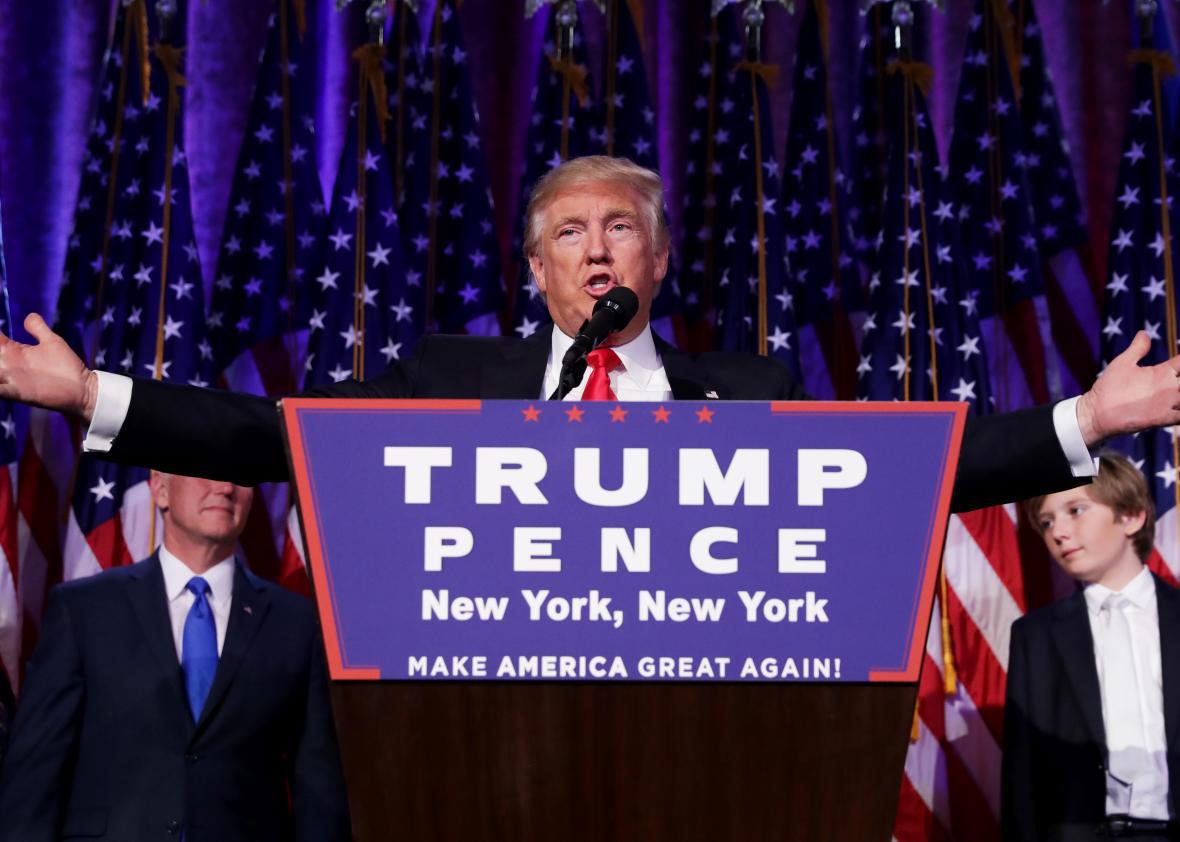Although he’s not much of a fan of the “overrated” Hamilton, Donald Trump has, according to the New York Times, “been a regular presence over the years at openings on Broadway, where he has said he prefers musicals and saw Evita as many as six times.” What are we to make of his love for the Andrew Lloyd Webber and Tim Rice musical, which debuted on Broadway in 1979 and was made into a 1996 film starring Madonna and Antonio Banderas?
Evita tells the story of the rise and fall of Eva Perón (née Duarte), beginning with her penniless origins, continuing through to her political career as the first lady to President Juan Perón of Argentina, and ending with her death from cancer. The musical frames the story of the Peróns through the eyes of a sardonic everyman narrator, Che. The show wrestles with Evita’s allure, simultaneously admiring her political genius and depicting her as gaudy, tasteless, and having made her career on her back. It also portrays her as the primary author of Juan Perón’s sham populism. In the musical, Perón is both a fascist and a bit of a bore, lacking the lupine imagination of the social-climbing radio personality he married.
In Evita, Eva, not Juan, is the tactical mastermind of the Peróns’ rise to power. Eva stage-manages Juan’s gradual appearance on the national scene and his resignation from the army. She also uses the free publicity she gets as a media figure to campaign for Juan on explicitly populist terms, promising her listeners that “There is only one man who can lead any workers’ regime / He lives for your problems, he shares your ideal and your dreams.”
It is Eva who understands the role of performance in politics. In “Don’t Cry for Me Argentina,” the musical’s most famous song, she addresses her nation with lyrics both self-pitying and patently false, claiming she “never invited” fortune and fame into her life and is truly dedicated to the people, not herself. Just a few minutes later, she reveals her showbiz acumen—and her hypocrisy—in one of the show’s most embarrassing couplets: “I came from the people, they need to adore me / So Christian Dior me from my head to my toes.”
The Eva Perón of Evita lives for her own advancement and stardom. She abandons the poor of Argentina to gallivant around the globe meeting leaders of various nations and only returns after a series of snubs from high-society types and diplomats. Finally turning to help the people who put her husband in office, she starts a foundation dedicated to making the dreams of her poorest constituents come true—and then loots it. As Che sings of the foundation, “Accountants only slow things down, figures get in the way / Never been a lady loved as much as Eva Perón.”
In short, Evita is a musical about a couple who use populism to advance their own careers and relentlessly ransack the state while staying beloved and popular. In part due to an earlier career in broadcast media, they understand how to manipulate gullible, low-information voters furious at a seemingly rigged status quo that has shut them out. Yet they never gain social acceptance among the elite because of their tackiness—much as the self-made millionaire hero of Trump’s favorite movie, Citizen Kane, fails to make up for the lack of love in his life by launching a career in politics.
Thanks to Che’s lacerating commentary and the often insipid lyrics given to its protagonist, Evita is more takedown than hagiography, even in its most sumptuous moments. Still, it’s not hard to imagine Donald Trump setting aside the show’s irony—for we have seen how little power irony has over him—and succumbing to the allure of Eva and Juan. Perhaps, nearly a decade from publishing The Art of the Deal, Trump saw that he could offer our nation a two-for-one, giving us Eva and Juan together in one orange, small-handed package. Sadly, as Eva died of cancer and Juan lost power in a military coup, the show offers little help to those of us who might be interested in stopping him.
